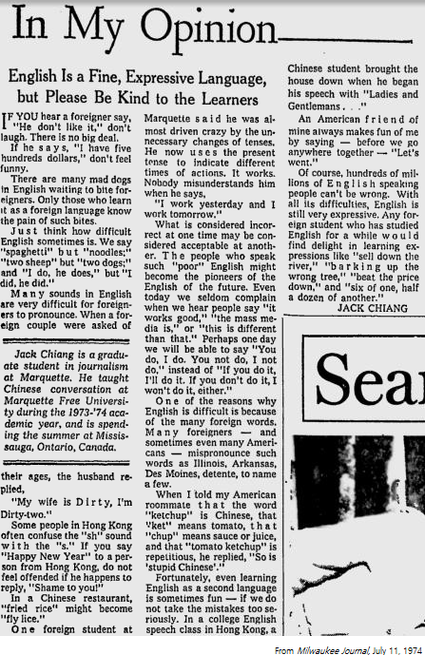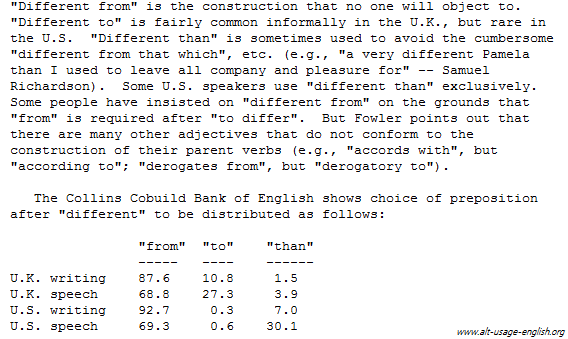The writer was a young man called Jack Chiang. From certain things he says, I would guess is from Hong Kong, and would further guess he is today 60s; possibly early 70s. I wonder what he’s made of the past four decades.
Here is the letter:
English Is a Fine, Expressive Language, but Please Be Kind to the Learners If you hear a foreigner say, “He don’t like it,” don’t laugh. There is no big deal. If he says, “I have five hundreds dollars,” don’t feel funny. There are many mad dogs in English waiting to bite foreigners. Only those who learn it as a foreign language know the pain of such bites.
Just think how difficult English sometimes is. We say “spaghetti” but “noodles;” “two sheep” but “two dogs;” and “I do, he does,” but “I did, he did.”
Many sounds in English are very difficult for foreigners to pronounce. When a foreign couple were asked of their ages, the husband replied, “My wife is Dirty, I’m Dirty-two.”
Some people in Hong Kong often confuse the “sh” sound with the “s.” If you say “Happy New Year” to a person from Hong Kong, do not feel offended if he happens to reply, “Shame to you!” In a Chinese restaurant, “fried rice” might become “fly lice.” One foreign student at Marquette said he was almost driven crazy by the unnecessary changes of tenses. He now uses the present tense to indicate different times of actions. It works. Nobody misunderstands him when he says, “I work yesterday and I work tomorrow.”
What is considered incorrect at one time may be considered acceptable at another. The people who speak such “poor” English might become the pioneers of the English of the future. Even today we seldom complain when we hear people say “it works good,” “the mass media is,” or “this is different than that.” Perhaps one day we will be able to say “You do, I do. You not do, I not do,” instead of “If you do it, I’ll do it. If you don’t do it, I won’t do it, either.”
One of the reasons why English is difficult is because of the many foreign words. Many foreigners — and sometimes even Americans — mispronounce such words as Illinois, Arkansas, Des Moines, detente,to name a few.
When I told my American roommate that the word “ketchup” is Chinese, that “ket” means tomato, that “chup” means sauce or juice, and that “tomato ketchup” is repetitious”, he replies “So is ‘stupid Chinese’.”
Fortunately, even learning English as a second language is sometimes fun — if we do not take the mistakes too seriously. In a college English speech class in Hong Kong, a Chinese student brought the house down when he began his speech with “Ladies and Gentlemans…” An American friend of mine always makes fun of me by saying — before we go anywhere together — “Let’s went.”
Of course, hundreds of millions of English speaking people can’t be wrong. With all its difficulties, English is still very expressive. Any foreign student who has studied English for a while would find delight in learning expressions like “sell down the river,” “barking up the wrong tree,” “beat the price down,” and “six of one, half a dozen of another.”
JACK CHIANG
Jack Chiang is a graduate student in journalism at Marquette. He taught Chinese conversation at Marquette Free University during the 1973-’74 academic year, and is spending the summer at Mississauga, Ontario, Canada.
[End of Quotation from the newspaper] [Original text]
(1) “It works good”. This sounds to me like an uneducated person’s phrasing. Probably we all agree this is a phrase that should not be written, and that if you want to say it in spoken speech, choose your company carefully. I don’t know how people reacted to “It works good” in the 1970s, but I doubt it’s made much more headway (if any) into standard English by the mid-2010s, now, than it had by the mid-1970s. “It works well” has held the line very well these past four decades, for whatever reason. Check again four decades from now, in the 2050s.
(2) “The mass media is”. He got this one right. Media has become a singular. “The media is” has become standard. And as well it should be! In Latin it’s a plural, but English is not Latin. The word functions as a singular in English. Checking Google, I find “the media is…” gets 27.3 million hits. Meanwhile, “the media are…” gets 10.2 million hits, and all the top results for “the media are…” we see to be language-learning websites discussing this very issue(!); in other words, there are not so many ‘living’ usages. Another of the front-page Google hits, as of this writing, for “media are” is a quotation from 1954. So much for “the media is” as incorrect English. One solid point to Jack Chiang.
(3) “This is different than that”. This one took me a little by surprise because it doesn’t even seem obviously wrong at first glance. I looked it up, and found this:
I have probably used “different than” in speech, but rarely in all but the most informal writing.
It’s strange how that works. I did a search of this website (again via Google), and I find that I’ve used “different from” many times and have never used “different than”. The latter phrase appears once on this website (before now), as part of a quotation from someone else (post-#129).(4)
“You do, I do. You not do, I not do.” I think Mr. Chiang probably meant this almost entirely as a joke. Even though the Chinese did get “no can do” and “long time, no see” into more-or-less standard spoken English, I can’t imagine any self-respecting English native speaker ever talking like, “You do, I do. You not do, I not do”. At best, that sounds like Yoda from Star Wars. I don’t think Chinese grammar has had any influence on American English. Maybe if China becomes the world’s superpower, this odd phrasing proposed by Jack Chiang forty years ago may become less odd. Check back in a few decades.And so Jack Chiang, writing in 1974, gets one prediction absolutely right (#2), one sort of right (#3), and two wrong, I think.
It’s only 2015. There’s a lot of future left to be had. And, say, why is “It works good” wrong, anyway?



Interesting letter… English is a tough language to master. Imagine how in a few centuries American English has changed from the “motherland’s” English–in accent and in use of words. And all the idioms! The day that I read this blog I was watching Wheel of Fortune and heard Pat Sajak comment on some of the commonly used phrases that don’t actually make sense. His examples: We CATCH a plane. We GRAB a bite. We JUMP in the shower. And there are so many more. BTW, on my various trips to Iowa over the years I frequently heard locals use the term It works good…